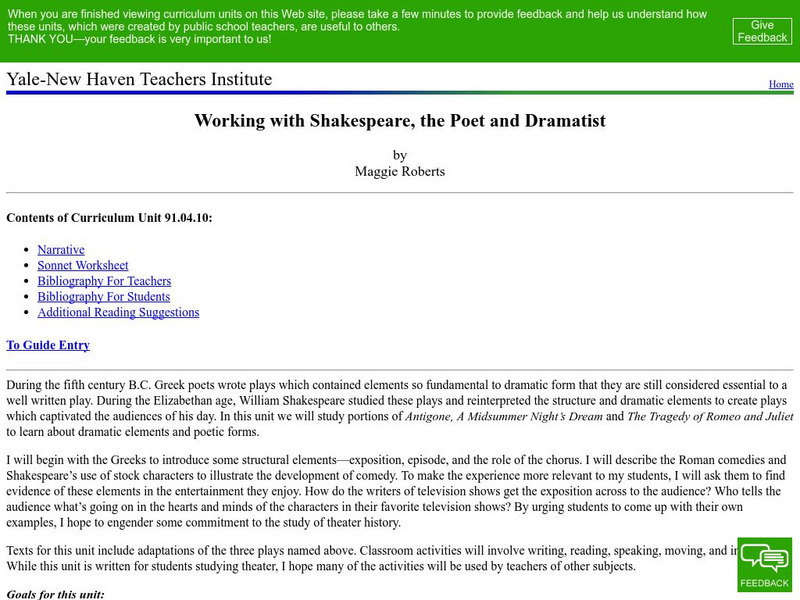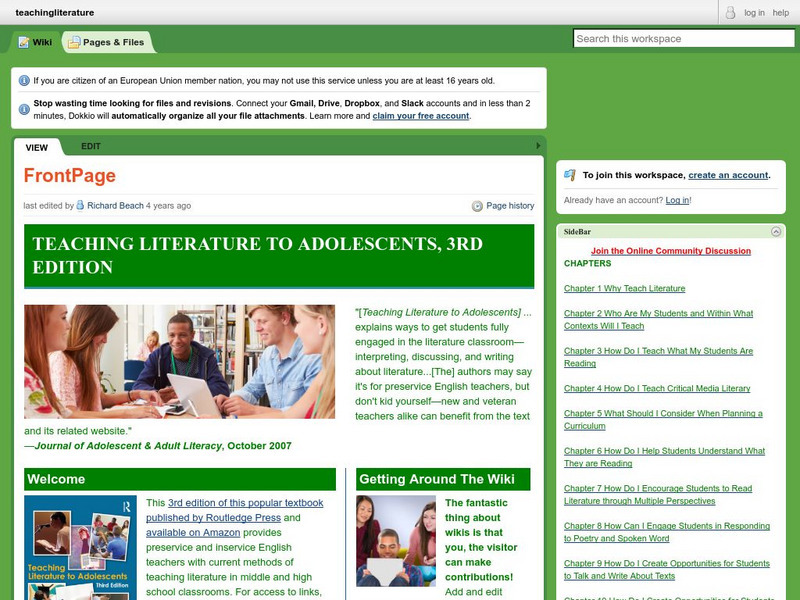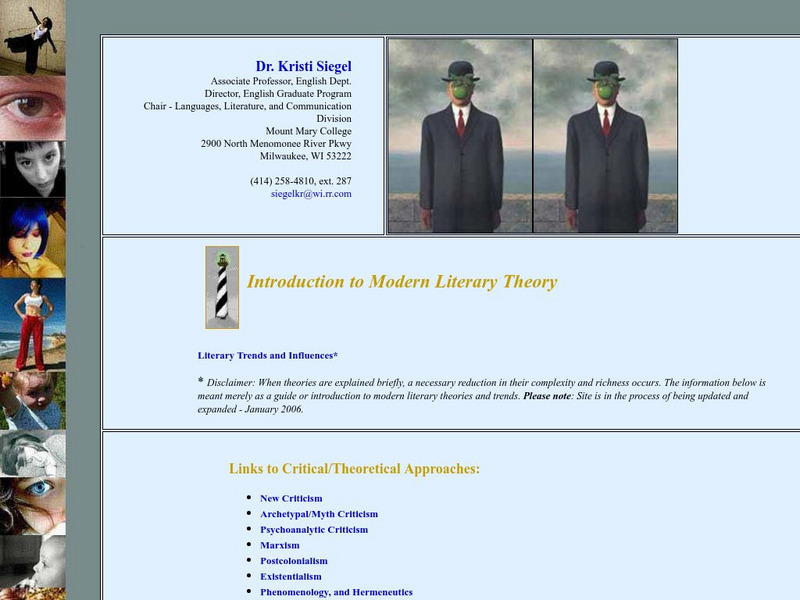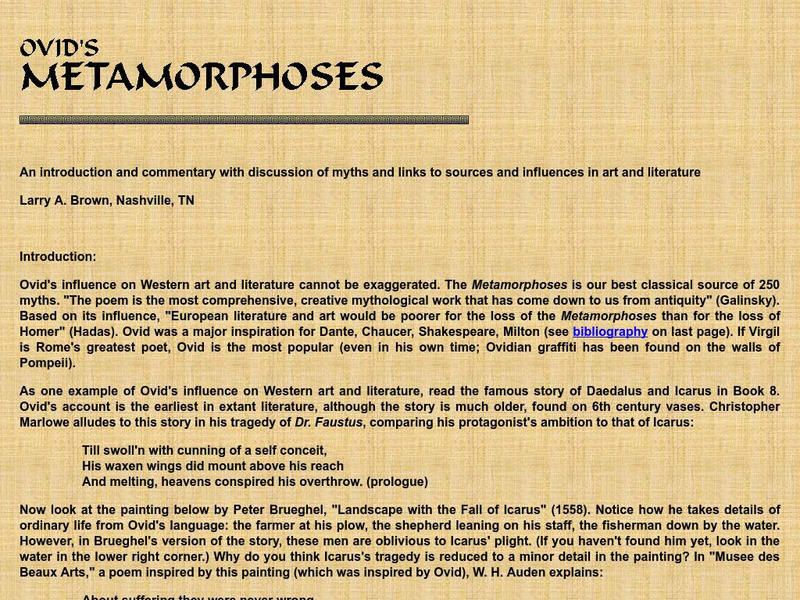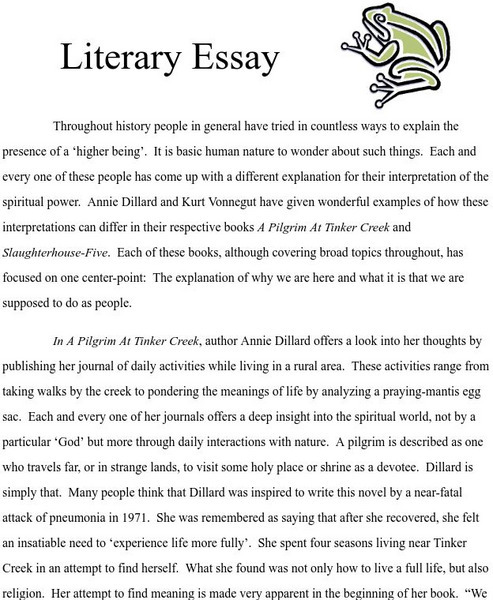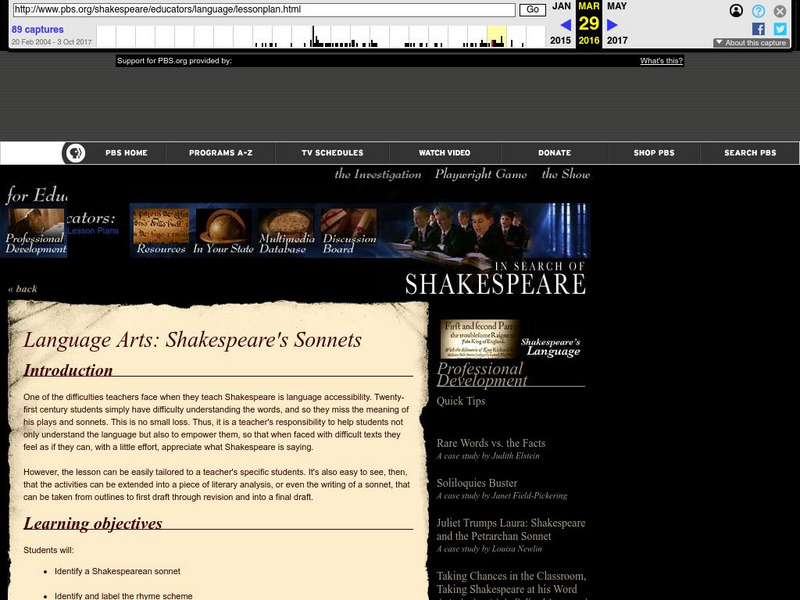Folger Shakespeare Library
Folger Shakespeare Library: Lesson Plan Archive: Page to Stage
Using the story of Pyramus and Thisbe, source material for Shakespeare's "Romeo and Juliet," lesson plan teaches students to analyze the structure of a play's text in a way that will give them a clearer understanding of how to perform...
University of Oxford (UK)
Beazley Archive: Medea
Illustrated dictionary entry for Medea, daughter to King Aeetes of Colchis. Illustrates her life, identifies her connection to the Argonauts and explores her magical witch-like powers.
University of Illinois
University of Illinois: Modern American Poetry: T. S. Eliot
This site presents information on T.S. Eliot's (1888-1965) life and career (including a biographical timeline), a bibliography of his works, a discussion of selected works, and links to related sites.
University of Pennsylvania
English Renaissance in Context: Unediting Lear
Since a number of different versions of Shakespeare's play King Lear have been found, which should be consitered the "real" one? Great multimedia tutorial that examines this problem faced by Shakespeare scholars.
Ted Nellen
Cyber English (By Ted Nellen): Poetry Analysis Fact Sheet
This is a Poetry Analysis Fact Sheet that includes how to analyze the parts of a poem including the title, connotations, tone, shifts, theme, poetic devices, and writing a paraphrase.
Yale University
Yale New Haven Teachers Institute: Working With Shakespeare
This site introduces Shakespeare as a poet and dramatist. Come and learn more about his life and work through this informative resource, which includes a sonnet worksheet, bibliography, activities, and more.
Rick Beach
Teaching Literature to Adolescents, 2nd Edition: Literature Links
The textbook entitled Teaching Literature to Adolescents, 2nd Edition contains activities links for American Literature. Intended for teachers and students, this site contains web links that provide many ways to assist and assess...
TED Talks
Ted: Ted Ed: Did Shakespeare Write His Plays?
Some people question whether Shakespeare really wrote the works that bear his name- or whether he even existed at all. Could it be true that the greatest writer in the English language was as fictional as his plays? Natalya St. Clair and...
Other
Mo Dept. Of Ed.: Analyzing and Evaluating Literary Works
Lesson plan designed for eleventh graders. Students analyze and evaluate a short story for elements of literary works such as theme, mood, word choice, imagery, tone, and main idea. Includes a student handout and a scoring guide. It...
Other
Kristi Siegel, ph.d.: Introduction Modern Literary Theory
This site provides an overview of literary terms and critical theories, compiled by a professor of English who teaches at the university level.
University of Toronto (Canada)
Univ. Of Toronto Libraries: Characters of Shakespear's Plays: "As You Like It"
Characters of Shakespeare's Plays was written by critic William Hazlitt and published in 1817. This chapter examines individual characters in Shakespeare's comedy As You Like It by analyzing several excerpts from the play.
Other
Brandeis University: Author Biographies: William Shakespeare
Biography of famous playwrite William Shakespeare, including a critical essay on his life and works, as well as a discussion of all of his famous plays.
Other
The Bible: A Cheatsheet [Pdf]
This wonderfully detailed .pdf document will aid those who need some background on the Bible in order to better understand literary allusions to the books and their content.
Other
Ovid's Metamorphoses: Introduction and Commentary
This resource provides a nice summary of the "Metamorphoses" by Ovid along with commentary and art influenced by the poem. Discusses the political situation of the time and how it works its way into the poem. Provides good analysis of...
Other
Cummings Study Guides: How Shakespeare Prepared Manuscripts
Learn many of the elements which Shakespeare used, or took into consideration, as he wrote the original manuscripts of his plays. How did he shape the English language with new words, how did he evoke settings when plays used few or no...
Other
Shakespeare.yippy: Shakespeare Searched
This is a Shakespeare search engine which allows students to search characters, themes, quotes, words, plays, sonnets, and more to aid in the study of Shakespeare. It also provides links for teachers and students.
Emory University
Shakespeare Illustrated
Paintings from the 19th century which portray scenes from Shakespeare's work are the focus of this site.
Universal Teacher
Moore's Teacher Resources: Studying "A Midsummer Night's Dream"
An excellent site from the UK that analyzes the Shakespearean comedy. Includes a comparison to "Romeo and Juliet," an analysis on the nature of love, stagecraft ideas, and thematic elements.
BBC
Bbc Bitesize: Higher English
This site provides information about characters, plot, and setting of several different pieces of literature. It offers links to activities and tests on topic such as analysis and evaluation, creation and production, drama, novels, and...
Bartleby
Bartleby.com: T. S. Eliot: Notes on the Blank Verse of Marlowe
This entry is based on "Notes on the Blank Verse of Christopher Marlowe" by T.S. Eliot (1888?1965), from The Sacred Wood: Essays on Poetry and Criticism (1922).
Other
Clemson University: Literary Essay
Literary essay example by a student discussing two works by Annie Dillard and Kurt Vonnegut, Jr. A good example of a strong literary essay.
Other
Uwm Libraries: All About William Shakespeare
University of Wisconsin's "Classic Text: Traditions and Interpretations" takes you through page after page of interesting, easy-to-read information regarding Shakespeare's life and works. Excellent resource.
University of Victoria (Canada)
The U Vic Writer's Guide: Literary Term: Novel
This site provides a general overview of the novel, including its history and generic forms. Includes a few examples and related links.
PBS
Pbs: Language Arts: Lesson Plans: Language Arts: Shakespeare's Sonnets
The purpose of this instructional activity is to help students cope with unfamiliar language in Shakespeare's sonnets and to help them understand and appreciate both what he says and how he says it.







